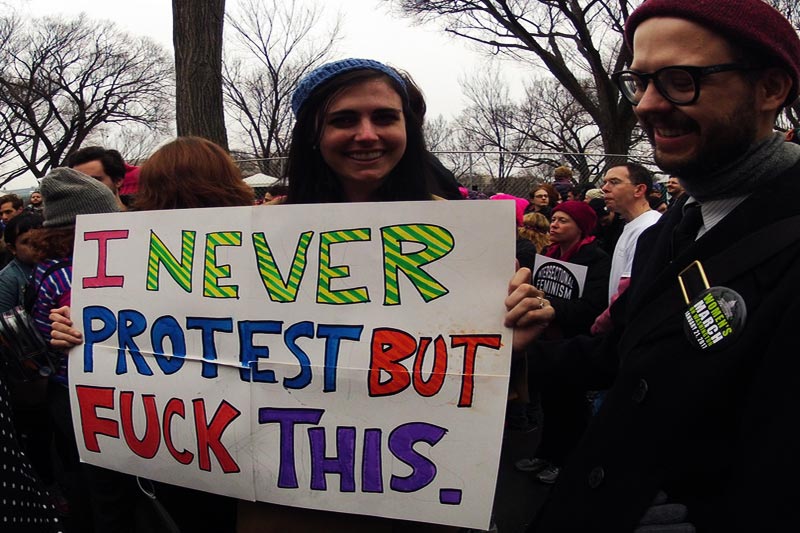Dear Resident President,
We chanted “This is what democracy looks like” as loud as we could from the White House lawn. I suppose the men on the roof were not taking notes.
I didn’t know the three blind women with canes who linked arms to march. They were beside me, along with babies in backpacks and strollers, men in wheelchairs missing limbs, women who spoke Spanish, or wore hajibs, a sea of homemade pussy hats.
We carried these letters to you in our hands, handmade signs and printed posters. It took some of us six hours to go five miles because there were so many men and women in front of us. All determined to go the distance.
This is what we wanted you to read and hear:
Martin Luther King Jr:
“Our lives begin to end the day we become silent about things that matter.”
I’m 72, too old for this shit, and I can’t believe we have to do this again. Black lives matter. Our children are watching. A quality man does not fear equality for women. I no longer accept the things I cannot change – I will change the things I cannot accept.
Audre Lord said,
“I am not free while any woman is unfree even when her shackles are very different than my own.”
We are daughters of immigrants — in as many languages as you can say it. Girls just want to have fundamental rights. My daughter deserves a President who respects women!
You started this pussy-grabbing talk. Get it now?
My pussy. My rules. Viva la Vulvalucion. And how about “Ain’t your taint” spelled out on a sign board in red-dyed tampons? Get it – get out of the locker room. Don’t interfere with Planned Parenthood. What you are best at making good again is Saturday Night Live. This pussy grabs back.
You wouldn’t have seen the letters from students that a teacher pasted on a signboard. The kids asked:
Why are you so rude? Will he help people who are sick? Can you make the world a better place? Why do you not like women so much? Do you hate Latinos? Black people? What is wrong with you?
As for theater as the safe place: on one stanchion stood two men stock-still throughout the march. On another, two women unmoving. The men’s’ sign said $1.00. The women’s’ said $.78. Equal pay. ERA.
It is American to say what must be said.
The power of the people is stronger than the people in power. My kitchen pantry is more qualified than your cabinet. So is IKEA’s.
Schools need guns for grizzlies? That’s enough, boys.
We’ll take it from here. If I am a snowflake, we are a blizzard. We can make American think again. A woman’s work is freedom – and it’s never done.
Climate change is a woman’s issue. Denial is not a policy. We are living on this planet as if we have another. There is no Planet B.
Strong women – may we know them. May we be them. May we raise them. A woman’s place is in the revolution. Respeta mi existencia o espera Resistencia. Juntas somos mas ponderosas.
When we can believe absurdities, we can be made to do atrocities.
The words of the tongue should have three gatekeepers: Is it true? Is it kind? Is it necessary?
Martin Luther King:
“A lie cannot live.”
Kids know the truth: alternative facts are lies. We are not turning the clocks back 50 years. Hell no, cheetah. We need a leader, not a tweeter. There could be hell toupee.
Signed,
Women in Women’s March on Washington
joined by 3.3 million women in 500 American towns and cities and by women all over the globe, from Delhi to Cape Town to Tokyo and points all over in between.
Photo Credit: Jill_Ion Flickr via Compfight cc
